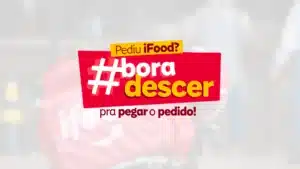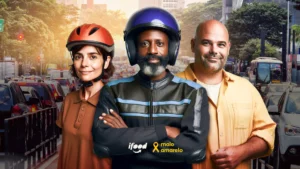Find out more about the course promoted by iFood and city halls to teach traffic safety and first aid
Why do some iFood delivery men and women run around wearing a white helmet? This is the way to identify who they are Helmet Angels, that is, professionals who took a course to learn how to drive safely and provide basic care when they witness an accident with victims.
These teachings have already been put into practice by Vanessa Barbosa Muniz, one of the graduates of the course held in Belo Horizonte (MG), in at least three situations since completing this training, in 2021.
“Thanks to the course, I knew how to reach the victim and do what was necessary. I called SAMU and also told her what she needed to do. In the most serious case, I performed cardiac massage on the person until help arrived, but unfortunately there was no way to save it”, he recalls.
This training helps to create awareness among delivery drivers that they can play a very important role in traffic safety. “Being able to train whoever arrives first is super valuable. This way you can save more people, avoid consequences and provide more adequate care when the SAMU team of rescuers arrives”, says Leonardo Gomes, general director of SAMU Metropolitano do Recife (PE), which also had a group of Angels in Helmets.
That was the feeling that Vanessa says she started to feel after the course. “I am an important person for traffic after the course because I can help people. I feel safe and I’m no longer afraid of seeing an accident”, he says. “I make a point of helping instead of turning my back like I did before. I do this with pleasure.”
Prevention, safety and first aid
Vanessa and other 549 delivery partners form the Helmet Angels squad that assists the Mobile Emergency Care Service (SAMU) in seven Brazilian cities by providing first assistance to those who suffer a traffic accident.
Even if it only affects one part of a larger road safety plan — which must also involve issues such as urban mobility, road safety and inspection—, actions such as Anjos de Capacete contribute to safer traffic for two reasons:
- Education and awareness that everyone has responsibility for traffic safety and that behaviors that put lives at risk must be abolished;
- First assistance to traffic victims (without, of course, replacing the work done by SAMU rescuers).
“iFood’s responsibility is with its delivery partners. We want healthy, happy delivery drivers, running around and getting home to their families”, comments Tayara Calina, senior coordinator of public policy projects at iFood.
Anjos de Capacete is supported by three pillars — accident prevention, traffic safety and first aid training — and carried out in a hybrid way, with distance classes — via iFood Takes Off — and in person.
Using the computer, delivery drivers learn about road safety, which driving behaviors lead to accidents, how to avoid them and which new habits should be incorporated to reduce the sad statistics of Brazilian traffic (we talk a little about defensive driving in this matter).
“It is essential that delivery people are aware of the impact of motorcycle trauma. Getting in touch with the routine of a first care already shows what this impact is”, says Roger Lage Alves, technical reference for the Urgency and Emergency Management of the Municipal Health Department of Belo Horizonte.
In face-to-face classes, held by SAMU on the premises of the municipality responsible for managing traffic in one of the cities hosting the course, delivery drivers learn how to assist victims of traffic accidents (or any other situation) that require immediate help.
“This is very positive for delivery drivers to become aware of how they have to behave in traffic and be prepared to provide a first service. Those who are on the street all the time end up seeing a lot of accidents happen”, says Tayara.
More Angels in the future
Anjos de Capacete emerged in 2020 and formed its first group of pilots with first aid skills in São Paulo (SP). The pandemic somewhat hindered the formation of new classes that year, since part of the course is taken in person.
In 2021, the project was resumed. It was there that the legion of Angels gained more followers. Belo Horizonte, Recife, Maceió (AL), João Pessoa (PB), Rio de Janeiro (RJ) and Londrina (PR) complete the list of the first seven cities. Campinas (SP), Salvador (BA), Brasília (DF) and Manaus (AM) should be the next to have white helmet delivery people.
Anjos de Capacete's first goal — being able to take the course to the five regions of the country — is close to being achieved. The project's big dream is to be present in all Brazilian capitals. And it becomes a recurring program, forming more and more Helmet Angels. “This depends on building partnerships with city halls and the SAMU agenda. But we have had a good reception from city halls”, says Tayara.
As it is a new project and due to the need to carry out feasibility tests, what guided the choice of cities that received the first classes of the course was the good relationship between iFood and the public administration. But, from 2022, the criteria will be expanded.
“One of the new criteria will be how many delivery people we have per city and whether there is a demand from the delivery people”, explains the iFood public policy coordinator. “There is no way for iFood to escape the debate on road safety. If we can contribute in a positive way, why not do that?”
How to call Angels in Helmets
Municipalities that are interested in the partnership can contact the iFood Public Policy area to welcome Anjos de Capacete in their cities, by email at policy@ifood.com.br.

